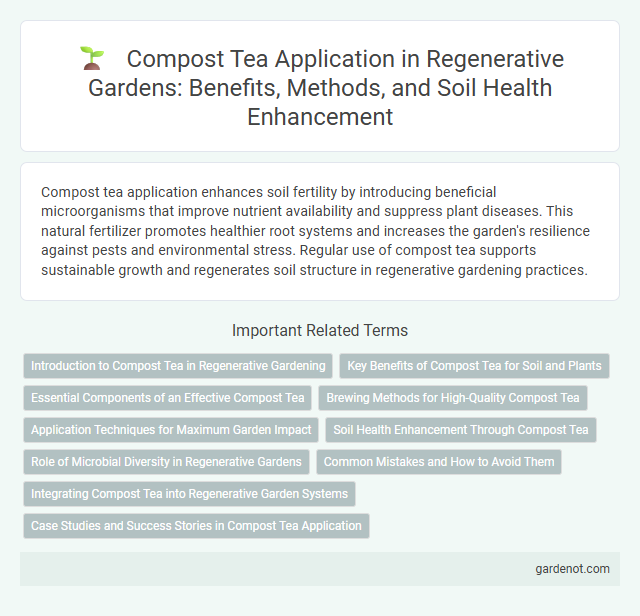Compost tea application enhances soil fertility by introducing beneficial microorganisms that improve nutrient availability and suppress plant diseases. This natural fertilizer promotes healthier root systems and increases the garden's resilience against pests and environmental stress. Regular use of compost tea supports sustainable growth and regenerates soil structure in regenerative gardening practices.
Introduction to Compost Tea in Regenerative Gardening
Compost tea is a nutrient-rich liquid derived from steeping compost in water, promoting soil microbial activity and enhancing plant health in regenerative gardening. This natural biofertilizer improves nutrient availability, supports beneficial microorganisms, and increases soil organic matter, which strengthens plant resilience and growth. Applying compost tea regularly helps restore soil ecosystems, reduces dependence on chemical inputs, and fosters sustainable, regenerative garden practices.
Key Benefits of Compost Tea for Soil and Plants
Compost tea enhances soil fertility by introducing beneficial microorganisms that improve nutrient availability and soil structure, promoting robust plant growth. It boosts plant immunity against diseases and pests through natural bioactive compounds, reducing the need for chemical treatments. Regular application increases microbial diversity and activity, leading to healthier, more resilient garden ecosystems.
Essential Components of an Effective Compost Tea
Effective compost tea relies on essential components such as high-quality compost rich in beneficial microorganisms, aerated water to promote aeration and microbial growth, and natural additives like molasses or kelp to provide nutrients and stimulate microbial activity. The balance of microorganisms, including bacteria, fungi, and protozoa, enhances soil fertility and plant health by improving nutrient availability and disease resistance. Proper brewing time, typically 24 to 48 hours, ensures the proliferation of beneficial microbes, maximizing the compost tea's regenerative impact on garden ecosystems.
Brewing Methods for High-Quality Compost Tea
Brewing high-quality compost tea involves using aerated methods to promote beneficial microbial growth, ensuring optimal oxygen levels throughout the process. Incorporating nutrient-rich compost and maintaining water temperature between 65-75degF accelerates microbial activity, resulting in a potent tea rich in bacteria, fungi, and protozoa. Regular monitoring and agitation during the 24-48 hour brewing period maximize microbial diversity and concentration, enhancing soil health and plant vitality in regenerative gardens.
Application Techniques for Maximum Garden Impact
Compost tea application techniques such as foliar spraying and soil drenching enhance nutrient uptake and microbial activity in a regenerative garden. Using aerated compost tea ensures higher populations of beneficial microbes, improving soil health and plant resilience. Applying compost tea during early morning or late afternoon maximizes absorption and minimizes UV degradation, leading to optimal garden impact.
Soil Health Enhancement Through Compost Tea
Compost tea application significantly boosts soil health by introducing a rich diversity of beneficial microorganisms that accelerate organic matter decomposition and nutrient cycling. This microbial diversity enhances soil structure, increases nutrient availability, and suppresses soil-borne pathogens, promoting robust plant growth and resilience. Regular use of compost tea improves soil aeration and moisture retention, fostering a regenerative ecosystem that supports long-term soil fertility and productivity.
Role of Microbial Diversity in Regenerative Gardens
Compost tea application enhances microbial diversity by introducing a rich community of beneficial bacteria, fungi, and protozoa essential for soil health in regenerative gardens. This increased microbial diversity improves nutrient cycling, disease suppression, and plant growth by establishing a balanced ecosystem within the soil. Diverse microbial populations in compost tea help break down organic matter more effectively, promoting sustained soil fertility and resilience against environmental stressors.
Common Mistakes and How to Avoid Them
Applying compost tea improperly can lead to ineffective nutrient delivery and potential pathogen growth, often due to over-fermentation or using contaminated materials. To avoid these mistakes, ensure aerobic conditions during brewing, use clean water sources, and apply the tea promptly within 4 hours of preparation to maintain beneficial microbial activity. Regularly monitoring pH levels between 6 and 7 helps optimize microbial growth and maximize the regenerative benefits for garden soil health.
Integrating Compost Tea into Regenerative Garden Systems
Integrating compost tea into regenerative garden systems enhances soil microbiome diversity, boosting nutrient cycling and plant resilience. Regular application of aerated compost tea introduces beneficial microorganisms that suppress pathogens while improving soil structure and moisture retention. This natural amendment supports sustainable growth by reducing the need for synthetic fertilizers and promoting a healthy, self-sustaining ecosystem.
Case Studies and Success Stories in Compost Tea Application
Compost tea application has demonstrated significant improvements in soil health and crop yield across various case studies, including organic farms in California and vineyards in France. These success stories reveal increased microbial diversity and enhanced nutrient uptake, leading to disease suppression and stronger plant growth. Data from long-term trials indicate that compost tea can reduce chemical fertilizer reliance by up to 40%, supporting regenerative agriculture's sustainability goals.
Compost tea application Infographic

 gardenot.com
gardenot.com